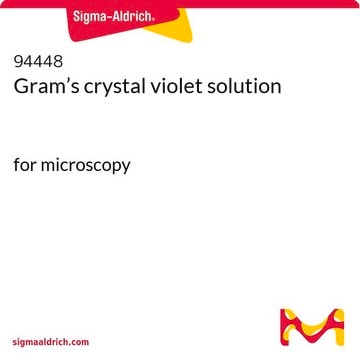61135
Kristallviolett
for microscopy (Bact., Bot., Hist., Vit.), indicator (pH 0.1-2.0)
Synonym(e):
Basic Violet 3, Hexamethylpararosanilinchlorid, Kristallviolett, Methylviolett 10B
About This Item
Empfohlene Produkte
Qualität
for microscopy (Bact., Bot., Hist., Vit.)
indicator (pH 0.1-2.0)
Qualitätsniveau
Form
powder
Farbe
green to very dark green
visual transition interval
0.1-2.0, yellow-green to blue-violet
mp (Schmelzpunkt)
205 °C (dec.) (lit.)
Dichte
1.190 g/cm3
ε (Extinktionskoeffizient)
≥1750 at 585-595 nm in water
Eignung
suitable for microscopy (Bact., Bot., Hist., Vit.)
Wirkungsspektrum von Antibiotika
fungi
Anwendung(en)
diagnostic assay manufacturing
hematology
histology
Wirkungsweise
cell membrane | interferes
enzyme | inhibits
Lagertemp.
room temp
SMILES String
[Cl-].CN(C)c1ccc(cc1)\C(c2ccc(cc2)N(C)C)=C3/C=C\C(C=C3)=[N+](/C)C
InChI
1S/C25H30N3.ClH/c1-26(2)22-13-7-19(8-14-22)25(20-9-15-23(16-10-20)27(3)4)21-11-17-24(18-12-21)28(5)6;/h7-18H,1-6H3;1H/q+1;/p-1
InChIKey
ZXJXZNDDNMQXFV-UHFFFAOYSA-M
Suchen Sie nach ähnlichen Produkten? Aufrufen Leitfaden zum Produktvergleich
Verwandte Kategorien
Allgemeine Beschreibung
Anwendung
- Crystal violet is mainly used in Gram staining and its variants, and for staining amyloid, bacterial components, and vascular plant tissues.
- It is used in polychrome staining of epoxy resin sections, viability staining of cultured neurons, and confocal optical sectioning to analyze meiotic structures.
- It is also employed in the acridine orange-crystal violet staining of intracellular bacteria, microsporidian spores, and cytological smears.
Biochem./physiol. Wirkung
Prinzip
Signalwort
Danger
H-Sätze
Gefahreneinstufungen
Acute Tox. 4 Oral - Aquatic Acute 1 - Aquatic Chronic 1 - Carc. 1B - Eye Dam. 1 - Muta. 2
Lagerklassenschlüssel
6.1C - Combustible acute toxic Cat.3 / toxic compounds or compounds which causing chronic effects
WGK
WGK 3
Flammpunkt (°F)
Not applicable
Flammpunkt (°C)
Not applicable
Persönliche Schutzausrüstung
Eyeshields, Faceshields, Gloves, type P3 (EN 143) respirator cartridges
Choose from one of the most recent versions:
Besitzen Sie dieses Produkt bereits?
In der Dokumentenbibliothek finden Sie die Dokumentation zu den Produkten, die Sie kürzlich erworben haben.
Kunden haben sich ebenfalls angesehen
Unser Team von Wissenschaftlern verfügt über Erfahrung in allen Forschungsbereichen einschließlich Life Science, Materialwissenschaften, chemischer Synthese, Chromatographie, Analytik und vielen mehr..
Setzen Sie sich mit dem technischen Dienst in Verbindung.








